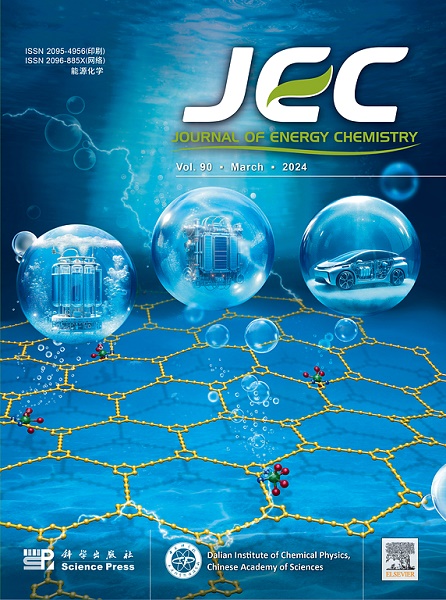A hydrogen-centric perspective on electrocatalytic nitrate reduction: Managing the active hydrogen lifecycle from generation to utilization
IF 13.1
1区 化学
Q1 Energy
引用次数: 0
Abstract
Electrocatalytic nitrate reduction reaction (NitRR) utilizing water as a hydrogen source under ambient conditions represents a highly promising avenue for sustainable ammonia synthesis and environmental remediation. However, achieving high efficiency and selectivity in NitRR is fundamentally challenged by the complex lifecycle management of active hydrogen derived from water splitting. This review provides a timely and comprehensive analysis centered on the pivotal role and meticulous regulation of active hydrogen throughout the NitRR process. We first elucidate the distinct functions and characteristics of various hydrogen species, followed by a survey of advanced characterization techniques crucial for monitoring the dynamics of active hydrogen. Critically, three core strategies were systematically dissected to modulate the active hydrogen lifecycle: accelerating water activation and dissociation, enhancing the directional transport of hydrogen species, and precisely tuning active hydrogen coupling pathways while suppressing parasitic hydrogen evolution. By consolidating current understanding from both catalyst design and reaction mechanism perspectives, this review offers a hydrogen-centric roadmap and highlights emerging opportunities for rationally engineering advanced NitRR systems.
以氢为中心的电催化硝酸还原视角:从产生到利用的活性氢生命周期管理
在环境条件下利用水作为氢源的电催化硝酸还原反应(NitRR)是一种非常有前途的可持续氨合成和环境修复途径。然而,水裂解产生的活性氢的复杂生命周期管理从根本上挑战了NitRR的高效率和选择性。本文围绕活性氢在NitRR过程中的关键作用和精细调控进行了及时、全面的分析。我们首先阐明了不同氢的不同功能和特征,其次是对监测活性氢动力学至关重要的先进表征技术的调查。关键是,系统剖析了三个核心策略来调节活性氢的生命周期:加速水的活化和解离,增强氢的定向运输,精确调节活性氢偶联途径,同时抑制寄生氢的演化。通过从催化剂设计和反应机理的角度巩固现有的认识,本文提供了一个以氢为中心的路线图,并强调了合理设计先进NitRR系统的新机会。
本文章由计算机程序翻译,如有差异,请以英文原文为准。
求助全文
约1分钟内获得全文
求助全文
来源期刊

Journal of Energy Chemistry
CHEMISTRY, APPLIED-CHEMISTRY, PHYSICAL
CiteScore
19.10
自引率
8.40%
发文量
3631
审稿时长
15 days
期刊介绍:
The Journal of Energy Chemistry, the official publication of Science Press and the Dalian Institute of Chemical Physics, Chinese Academy of Sciences, serves as a platform for reporting creative research and innovative applications in energy chemistry. It mainly reports on creative researches and innovative applications of chemical conversions of fossil energy, carbon dioxide, electrochemical energy and hydrogen energy, as well as the conversions of biomass and solar energy related with chemical issues to promote academic exchanges in the field of energy chemistry and to accelerate the exploration, research and development of energy science and technologies.
This journal focuses on original research papers covering various topics within energy chemistry worldwide, including:
Optimized utilization of fossil energy
Hydrogen energy
Conversion and storage of electrochemical energy
Capture, storage, and chemical conversion of carbon dioxide
Materials and nanotechnologies for energy conversion and storage
Chemistry in biomass conversion
Chemistry in the utilization of solar energy
 求助内容:
求助内容: 应助结果提醒方式:
应助结果提醒方式:


